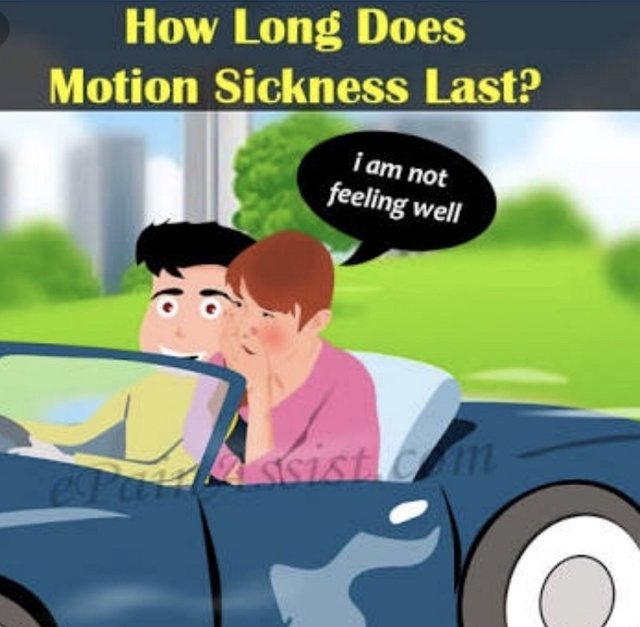motion sickness
Everyone has the capacity to become motion sick, but there’s no real explanation for why some people do and others don’t.

Motion (or travel) sickness occurs when you feel unwell due to being in a moving vehicle. Commonly known as ‘car sickness’ or ‘sea sickness’, it is a normal response and can generally be prevented.
Motion sickness may occur in response to certain types of movement, whether it is the person or what they are looking at (for example, a movie screen) that is moving. Motion sickness is not considered to be a disease as it can occur in nearly every person.
Motion sickness happens when what your body feels is happening doesn’t match up with what it sees.
If a person is exposed to motion for an extended period (for example, during a long journey at sea) or has repeated exposures, their brain may adapt in time to the constant motion and they may no longer experience motion sickness.
Both theories of motion sickness involve a dissonance between expectations and reality.
Causes
The cause of motion sickness is complex and not fully understood, but most experts believe that it arises due to conflicts in sensory input to the brain. The brain senses motion through different signaling pathways from the inner ear (sensing motion, acceleration, and gravity), the eyes (vision), and the deeper tissues of the body (proprioceptors). When the body moves involuntarily, such as when riding in a vehicle, there may be conflict among these different types of sensory input to the brain. The sensory apparatus in the inner ear seems to be most critical in the development of motion sickness.
Diagnosis
There are no diagnostic tests for motion sickness; the diagnosis is made by the characteristic symptoms appearing during travel or during any form of passive motion.
Symptoms
Nausea is the main symptom of motion sickness but you might also experience other symptoms, including:
1.vomiting
2.dizziness
3.drowsiness
4.headache
5.inability to walk
6.persistent retching.
Risk factor
motion sickness more likely to occur, including:
1.Women are generally more susceptible than men.
2.Children are more susceptible than adults (generally between the ages of two and 12 years).
3.Hormonal factors include pregnancy, menstrual cycle factors and oral contraceptives.
4.Other balance disorders may be a factor, particularly vestibular disease and migraine.
5.A person who has experienced motion sickness in the past may have worse symptoms on future trips by expecting to feel sick.
Treatment
Research suggests that ginger can help to ease the symptoms of motion sickness. You could chew on raw ginger or make a quick tea by adding minced ginger to boiling water.
You may need to experiment with different medication to find which one works best for you. Ask your doctor or pharmacist for more information.
Primary Prescription
Some of the more common medications that can be used for motion sickness include:
1.scopolamine (transdermal patches, Transderm-Scop)
2.dimenhydrinate (Dramamine)
3.meclizine (Antivert, Bonine, Meni-D, Antrizine)
4.promethazine (Phenergan, Phenadoz, Promethegan)
5.diphenhydramine (Benadryl)
6.cyclizine (Marezine)
Self care
1.Some people are particularly sensitive to certain kinds of motion.
2.Symptoms of motion sickness include dizziness, nausea and vomiting, burping, and sweating.
3.Treatment is often best taken before the motion begins.
Dr. Shivani Bhardwaj
I upvoted you and followed you you in return you do the same. https://steemit.com/mgsc/@navesumar/respect-women-you-are-nothing-without-them
I upvoted you and followed you in return you do the same. https://steemit.com/mgsc/@navesumar/respect-women-you-are-nothing-without-them